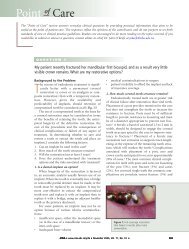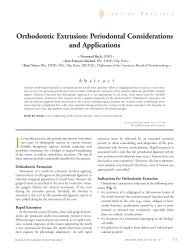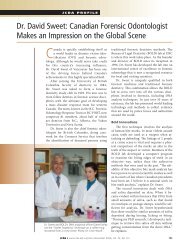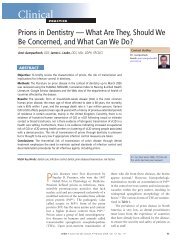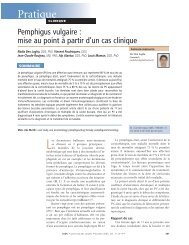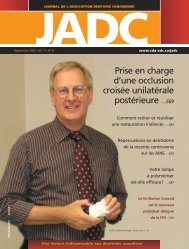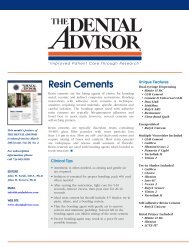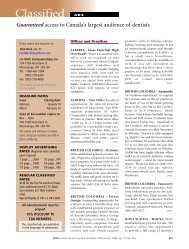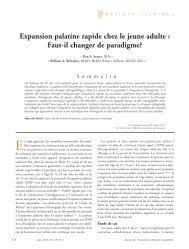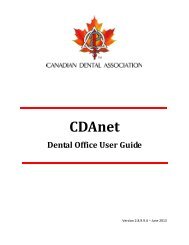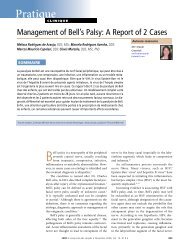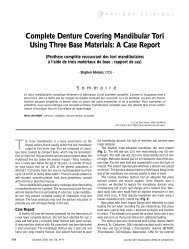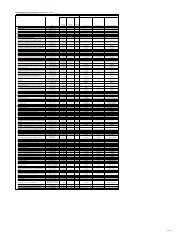JCDA - Canadian Dental Association
JCDA - Canadian Dental Association
JCDA - Canadian Dental Association
You also want an ePaper? Increase the reach of your titles
YUMPU automatically turns print PDFs into web optimized ePapers that Google loves.
dentists that could increase their knowledge and skills regarding<br />
implant interventions. We contacted 4 groups that<br />
serve as main sources of dental information to practising<br />
<strong>Canadian</strong> dentists: implant manufacturers, university<br />
dental faculties, dental associations and dental regulatory<br />
bodies. In particular, we wished to know whether dentists<br />
were offered articles about implant treatment, including<br />
scientific evidence to support this intervention; courses<br />
in which they could receive information on the rationale<br />
for this treatment, as well as clinical training to improve<br />
their skills in implant care; and any additional information<br />
or assistance to bring this new technology into their<br />
practices in the 2006 calendar year.<br />
Based on our findings, we determined that there was<br />
an abundant amount of information on dental implants<br />
available to <strong>Canadian</strong> dentists in 2006, more than we had<br />
initially anticipated. The information was made available<br />
through continuing dental education or Internetbased<br />
courses, visits by sales representatives of dental<br />
companies, publications in <strong>Canadian</strong> journals and newsletters,<br />
presentations at dental conferences and meetings,<br />
brochures, emails, dentistry faculty websites, flyers and<br />
direct mailing and advertisements in dental journals and<br />
alumni magazines. The large amount of information disseminated<br />
suggests a high probability that all dentists<br />
have been exposed to implant-related information, regardless<br />
of geographic location.<br />
Most of the information on implants was made available<br />
by implant manufacturers, who earmark considerable<br />
resources for marketing and education. However,<br />
many courses on dental implants were also made available<br />
by dental schools, dental associations and at least<br />
one dental regulatory agency. This shows that dentists<br />
have access to a wide range of reliable sources of information<br />
that should, at the very least, assure them<br />
that dental implant therapy or technology is scientifically<br />
supported.<br />
The availability of continuing dental education<br />
courses on implants by dental schools, regulatory agencies<br />
and associations suggests that implant treatment has<br />
been accepted as a reliable, scientifically supported mode<br />
of therapy. Therefore, practising dentists who currently<br />
do not offer dental implants as a treatment modality<br />
to their edentulous patients are advised to investigate<br />
the field and inform their patients of these treatment<br />
––– Feine –––<br />
options. Since dental implant therapy is a scientifically<br />
substantiated treatment, it is the responsibility of dentists<br />
to learn about this technology. It would be wise for<br />
dentists not currently offering this treatment modality to<br />
their edentulous patients to consider taking continuing<br />
education courses in order to educate themselves on the<br />
topic, since they are ethically and legally obligated to<br />
inform their patients about implants as an alternative<br />
to standard treatments. Not all dentists currently do so,<br />
which contravenes the principle of informed consent.<br />
Advances in technology within dentistry will continue,<br />
and new technologies that are improvements to current<br />
practice should be rapidly transferred to patients. a<br />
THE AUTHORS<br />
628 <strong>JCDA</strong> • www.cda-adc.ca/jcda • September 2008, Vol. 74, No. 7 •<br />
Mr. Rashti is an undergraduate dental student in faculty of<br />
dentistry, McGill University, Montreal, Quebec.<br />
Dr. Esfandiari is a PhD candidate in the faculty of dentistry,<br />
McGill University, Montreal, Quebec.<br />
Ms. Lemieux is an undergraduate dental student in the<br />
faculty of dentistry, McGill University, Montreal, Quebec.<br />
Dr. Feine is a professor and director of graduate studies at the<br />
faculty of dentistry, McGill University, Montreal, Quebec.<br />
Correspondence to: Dr. Jocelyne Feine, McGill University, 3550 University<br />
Street, Suite #101, Montreal QC H3A 2A7.<br />
The views expressed are those of the authors and do not necessarily reflect<br />
the opinions or official policies of the <strong>Canadian</strong> <strong>Dental</strong> <strong>Association</strong>.<br />
References<br />
1. Millar WJ, Locker D. Edentulism and denture use. Health Rep 2005;<br />
17(1):55–8.<br />
2. Millennium Research Group. <strong>Canadian</strong> markets for dental implants 2007.<br />
April 2007.<br />
3. Tosto Jr., M. <strong>Dental</strong> implants in Canada: a growing opportunity. Oral<br />
Health 2006; 96(8):37–9.



